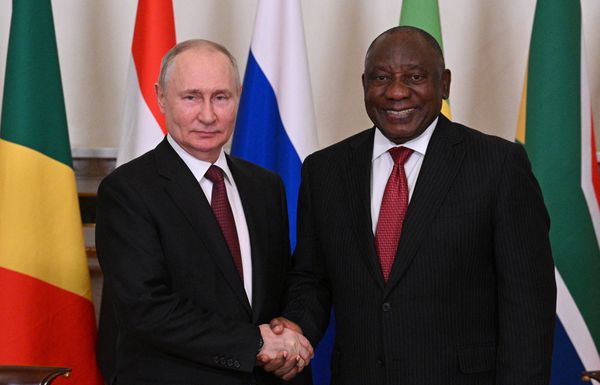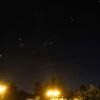
Russian President Vladimir Putin shakes hands with South Africa’s President Cyril Ramaphosa on June 17, in this handout photograph.RAMIL SITDIKOV/AFP/Getty Images
Russian President Vladimir Putin, who is facing an arrest warrant from the International Criminal Court for war crimes in Ukraine, has cancelled a planned visit to a summit meeting in South Africa after the host government made clear it cannot ignore the warrant.
Experts on international law see the decision as a victory for the credibility and legitimacy of the international court. South African officials have said publicly the Kremlin wanted Mr. Putin to attend next month’s summit, an annual meeting of leaders of the BRICS group of countries. But South Africa – as an ICC member state – was unwilling to defy the court’s rules.
The international court, based in The Hague, issued the warrant for Mr. Putin in March, accusing him of bearing responsibility for abductions of Ukrainian children and their deportation to Russia.
Russia is a key member of BRICS, which is holding its summit in Johannesburg. By tradition, the summit is attended by the top leaders of each member: Russia, China, India, Brazil and South Africa.
For months, South Africa has been studying its legal and diplomatic options, refusing to say whether Mr. Putin would attend the summit despite the warrant. South Africa’s membership in BRICS is crucial to its foreign policy, and it was reluctant to anger the Kremlin over the issue.
South African President Cyril Ramaphosa, in a statement on Wednesday, said Mr. Putin will not attend the summit “by mutual agreement.” Instead he will send his foreign minister, Sergei Lavrov, the statement said.
Russian officials, in separate comments to a Russian state news agency on Wednesday, said Mr. Putin will participate in the BRICS summit by video link.
The video-link option had been widely discussed over the past two months, but South African deputy president Paul Mashatile told local media Moscow was unwilling to accept the suggestion. “The Russians are not happy,” he told the South African media outlet News24 last week. “They want him to come.”
Mr. Mashatile, who headed a committee that studied the Putin visit options, said it would be impossible for South Africa to arrest him. “That’s why, for us, his not coming is the best solution,” he told News24.
In a court affidavit disclosed this week, Mr. Ramaphosa said the Russian government had made it clear to South Africa that an arrest of Mr. Putin would be “a declaration of war.” He also said South Africa had asked the ICC to consider whether Mr. Putin could be given diplomatic immunity to attend the BRICS summit.
Hannah Woolaver, an associate professor of public international law at the University of Cape Town, told The Globe and Mail the announcement that Mr. Putin will not attend the summit is a victory for the international rule of law. “It demonstrates a significant shift in South Africa’s respect for the ICC, augmenting the credibility of the court more generally,” she said.
Thuli Madonsela, a prominent South African law professor who held the country’s independent constitutional post of public protector for seven years, praised the news of Mr. Putin’s cancelled visit. “South Africa has many faults, but being a rogue state is not one of them,” she tweeted on Wednesday. “The rule of law has always been one of our strongest links.”
John Steenhuisen, leader of the Democratic Alliance, the largest opposition party in South Africa, said in a statement after Wednesday’s announcement that the country’s reputation on the international stage had been at stake over the issue. His party had gone to court to seek an order requiring the government to arrest the Russian leader if he visited. “Getting Vladimir Putin to bend the knee before the rule of law is no small feat,” he said.
The announcement will also be welcomed by Western leaders, who have been increasingly worried South Africa is tilting toward Moscow in the international arena.
Canadian officials have been attending United Nations events this week, to celebrate the 25th anniversary of the adoption of the Rome Statute, which created the International Criminal Court. Canada has been a strong supporter of the court, and played a key role in its establishment in the late 1990s.
Mark Kersten, an assistant professor of criminal justice at the University of the Fraser Valley who has written extensively on ICC issues, told The Globe the Putin case has shown that the court still has the power to “shrink the world” for alleged war criminals who remain free.
“In cases where the court issues arrest warrants that it has little to no chance of having immediately enforced, like with Putin, it is said by the ICC’s champions that they will at least make it harder for suspects to travel freely,” he said. “That appears to be exactly what happened here.”
Sergey Vasiliev, an associate professor of international criminal law at the University of Amsterdam, said the cancellation of the Putin visit to South Africa “helps reaffirm the authority of the ICC and preserve the integrity of the Rome Statute system.” It shows that the court’s arrest warrants can have an impact on the international reputation and travel of the court’s suspects, even if they are powerful heads of state in countries that don’t belong to the court, he said.
“The fear of attempted arrest is thus real, and Putin has become so toxic that even Russia’s BRICS partner has negotiated and succeeded in ensuring non-attendance,” Mr. Vasiliev said.
In the end, he added, Moscow had no choice but to accept South Africa’s face-saving offer of a “mutual agreement” that Mr. Putin would not visit the country.
“South Africans simply did not want to host this highly inconvenient guest,” he said.
This post was originally published on this site be sure to check out more of their content.








